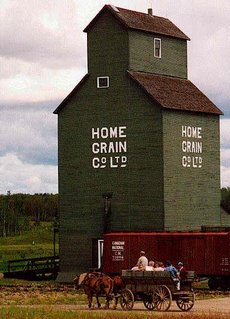
The underwhelming coverage of the Conservative attempt coup d'etat at the Wheat Board.
The Blogging Tories who should be overwhelmingly leading the cheering section here, have nada, zip, zero, nothing to say about the Barley Plebiscite.
And no I am not kidding.
This is astounding that those who have lobbied and fought so long and hard to destroy the farmer cooperative which for them has been a symbol of Canadian Socialism have been deafening in their silence on the barley plebiscite. Stage One of the Conservative governments dismantling of the producer cooperative they call a Monopoly.
I even checked the Canadian Blog Exchange and found only posts by Progressive Bloggers.
In fact members of the Progressive Bloggers posted seven stories.
Tories Sink To New Depths On Barley Vote
Stacking the deck
Do Farmers Know What They Really Voted For?
Sham
A resounding outcome
Farmers Reject Phony Plebiscite
Misusing regulations and how the Conservative's plan to dismantle the CWB's monopoly.
I had to Google blogs on the Wheat Board before I could find a single BT who blogged on the issue.
However never let it be said that Sad Sack Kate over at SDA did not leave a stone unturned. She did blog on the Barley vote. And she too tried to point out that the majority voted for choice. Which of course ignores the fact that the majority voted to keep the Wheat Board, even if they supported choice. And that an even greater majority boycotted the government sponsored vote.
Which corresponds to something I have observed; the BT's are predominately Easterners. And when they are Westerners they are too busy reading, studying, repeating, and reiterating Republican thought from south of the border.
Showing that the real radical reform politics that is Prairie Populism, proves the West is Left.
And so this most essential Western Canadian issue of political import, as Janis Joplin would say, was of no import to the Conservative Government echo chamber.
Passing strange since Chuck Strahl and the government claimed it was a victory.
If it was a victory it was a hollow one. Little fanfare for the Barley plebiscite amongst the echo chamber, little pro government coverage in the MSM, and the majority of farmers rejected the Conservatives attempt to eliminate the Wheat Board through its plebiscite.
Passing strange indeed. As Sherlock Holmes would say about the lack of response from the BT; the dog did not bark in the night.

I s there any point to which you would wish to draw my attention?"
"To the curious incident of the dog in the night-time."
"The dog did nothing in the night-time."
"That was the curious incident"
The Edmonton Journal
Published: Saturday, March 31, 2007It was a Conservative who first created the Canadian Wheat Board, another Conservative who made it a monopoly, so it's only fitting that it's a Conservative who seems eager to pull the trigger on its execution.
In 1917, Robert Borden established the Board of Grain Supervisors to establish a price for grain in an effort to limit volatility in a time of war. After the war ended, the board became known as the Canadian Wheat Board. In 1935 -- at the height of the Great Depression and the dust bowl -- the board was taken over by R.B. Bennett's government to ensure Western farmers a consistent and predictable return on their crops. Losses were covered by the government, and profits absorbed by it.
Now, the Harper government plans to break the seven-decade-old monopoly system based on a confusing, one-sided, and supposedly non-binding referendum in which opponents of the wheat board -- including some of the companies that stand to benefit most from the end of the wheat board monopolies -- were allowed to run a public relations campaign against the single-desk barley and grain marketing board, while the board was unable to campaign to remind farmers of the services it provides.
Even with that, only 14 per cent of 29,076 farmers (the government has not revealed how many were actually eligible to vote) chose to completely remove the wheat board from the barley market. The rest of the votes split relatively evenly between maintaining the monopoly as it is, and giving farmers "a choice" of selling to the wheat board or going it alone on the open market.
The wheat board exists principally to reduce the volatility inherent in farming and to guarantee farmers a more steady cash flow. Critics of the Harper government's plan to "offer choice" say that without a monopoly, this function is virtually impossible, since non-CWB farmers taking their crops to market will always be in a position to undersell the board.
If the board is forced to try to undercut the non-CWB farmers, that will prompt a rush to the bottom, pushing prices downward -- good for the foreign buyers, but bad for Canada.
Even if the wheat board could outsell the individual farmers, it would be a ridiculous proposition for a federally owned organization to be in direct competition with other Canadian farmers. Moreover, it would also almost surely run afoul of trade law, which currently only tolerates the wheat board because it was grandfathered into Canadian trade agreements.
This likely means the only logical outcome of ending the wheat board's monopoly is for it to leave the playing field for barley. And, presumably, it's only a matter of time before the government presses for "choice" on all forms of wheat sales, with a similar outcome.
See:
Wheat BoardCanada, agriculture, wheat, WTO, G8, WheatBoard, farmers, Western-Canada, barley, wheat, Strahl, Government, Conservatives, Harper,
Canada
Politics
Harper
CWB
Wheat Board
farming
Supply Side Management
Conservatives






